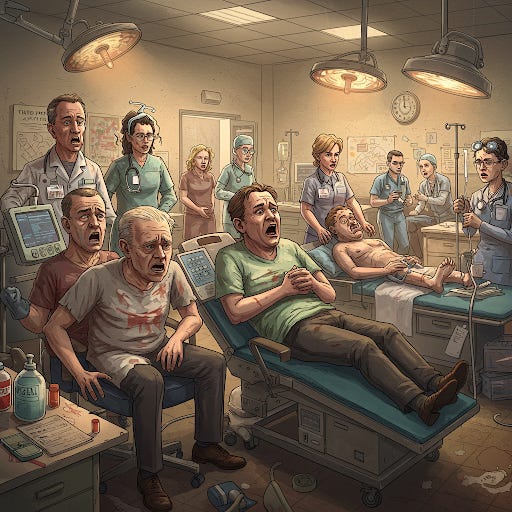The Orange Elephant in the Room: A Clinical Exploration of Trump Adversity Syndrome (TAS).
"It's Gonna Be Yuge!": The Impact of TAS on Public Health Infrastructure.
In these turbulent times, a new and devastating affliction has swept across the globe: Trump Adversity Syndrome, or TDS. Once relegated to fringe internet forums, TDS has now infiltrated polite society, leaving a trail of bewildered therapists and empty chamomile tea shelves in its wake. Symptoms range from the mild (inability to enjoy a quiet afternoon without muttering about "alternative facts") to the severe (spontaneous combustion of red baseball caps).
Medical experts, primarily those with online degrees in political psychology, attribute this condition to prolonged exposure to... well, you know who. The sheer gravitational pull of certain political figures, it seems, can warp the very fabric of mental well-being, causing sufferers to see phantom tweets in their breakfast cereal and hear the faint strains of "Hail to the Chief" in their refrigerator hum.
The most concerning aspect of TDS is its highly contagious nature. A single, unguarded conversation about "the orange one" can infect an entire dinner party, transforming a pleasant gathering into a cacophony of enraged pronouncements and flailing hand gestures. Thankfully, a cure is on the horizon. Preliminary studies suggest that a steady diet of historical documentaries, coupled with a strict ban on cable news, can significantly alleviate symptoms. However, until a definitive treatment is discovered, we urge everyone to exercise extreme caution and avoid prolonged exposure to any form of media that might trigger a relapse. And for goodness sake, if you see someone wearing a "Make America Great Again" hat, just smile, nod, and slowly back away. Your sanity might depend on it. Here’s what’s known about TAS so far.
Symptoms:
"Tweet-Induced Tremors": Involuntary shaking of the hands, particularly when exposed to social media feeds.
"Alternative Fact Amnesia": Selective memory loss, characterised by an inability to recall events contradicting preferred narratives.
"Hair-Trigger Hyperbole": An uncontrollable urge to exaggerate and use superlatives in everyday conversation.
"Golden Escalator Anxiety": A fear of descending any form of staircase or escalator.
"Red Cap Rejection": An extreme aversion to the colour red, especially when applied to headwear.
"Wall Building Compulsion": An obsessive need to construct barriers, often using inappropriate materials (e.g., pillows, office supplies).
"Covfefe" induced cognitive dysfunction, where speech becomes jumbled, and incoherent.
Effect on Patients:
Social isolation due to the inability to engage in rational discourse.
Financial strain from excessive purchases of "Make America Great Again" merchandise.
Relationship breakdown due to constant political debates at the dinner table.
Increased levels of stress, and anxiety.
Case Notes:
Case 1: "Karen," 45, Suburban Homemaker:
Symptoms: Severe "Tweet-Induced Tremors," uncontrollable outbursts of "fake news!" during grocery shopping.
Diagnosis: Stage 3 TAS.
Treatment: Prescribed a strict social media detox and mandatory viewing of historical documentaries.
Case 2: "Chad," 22, College Student:
Symptoms: "Hair-Trigger Hyperbole," constant repetition of "it's gonna be yuge!" in academic presentations.
Diagnosis: early onset TAS.
Treatment: mandatory classes in critical thinking, and logical fallacies.
Case 3: "Elderly Gentleman," 80, Retired:
Symptoms: "Wall Building Compulsion," constructed a miniature border wall around his vegetable garden.
Diagnosis: Advanced TAS with comorbid "Fox News Dependency Syndrome."
Treatment: 24 Hour news blackout, and increased social interaction.
Impact on Health Services:
Emergency rooms are overwhelmed with patients suffering from "Tweet-Induced Tremors" and "Alternative Fact Amnesia."
Mental health professionals are experiencing burnout due to the sheer volume of TAS cases.
Hospitals are running out of supplies of calming tea and fact-checking pamphlets.
The rise of "TAS" has put a great strain on medical personnel, and resources.
In recent weeks, medical journals have been abuzz with reports of a newly identified affliction: Trump Adversity Syndrome (TAS). Symptoms manifest in a variety of fascinating ways, including but not limited to: spontaneous outbursts of performance art featuring interpretive dance based on congressional transcripts, an uncontrollable urge to knit miniature replicas of the White House out of artisanal yarn, and the sudden development of a highly specific allergy to orange-tinted spray tans. Experts speculate that TAS is triggered by prolonged exposure to historical news cycles and an over-reliance on social media for emotional validation. Some have even suggested a link to consuming excessive amounts of artisanal pickles. The CDC, while officially remaining neutral, has issued a strongly worded advisory recommending a daily regimen of deep breaths, chamomile tea, and mandatory viewing of vintage Bugs Bunny episodes.
The true genius of TAS, according to leading pseudo-scientists, is its ability to induce rapid-onset historical amnesia, specifically regarding the pre-2016 era. This selective memory loss allows sufferers to construct elaborate narratives where the current political climate is both unprecedented and uniquely catastrophic, thus justifying the aforementioned performance art and pickle consumption. Further research is needed, but early findings suggest that TAS is highly contagious, spreading primarily through online echo chambers and late-night cable news.
In conclusion, while the medical community remains divided on the existence and severity of Trump Adversity Syndrome, one thing is clear: it’s definitely something to write a strongly worded tweet about, while simultaneously crafting a tiny yarn-based replica of a specific governmental building.



